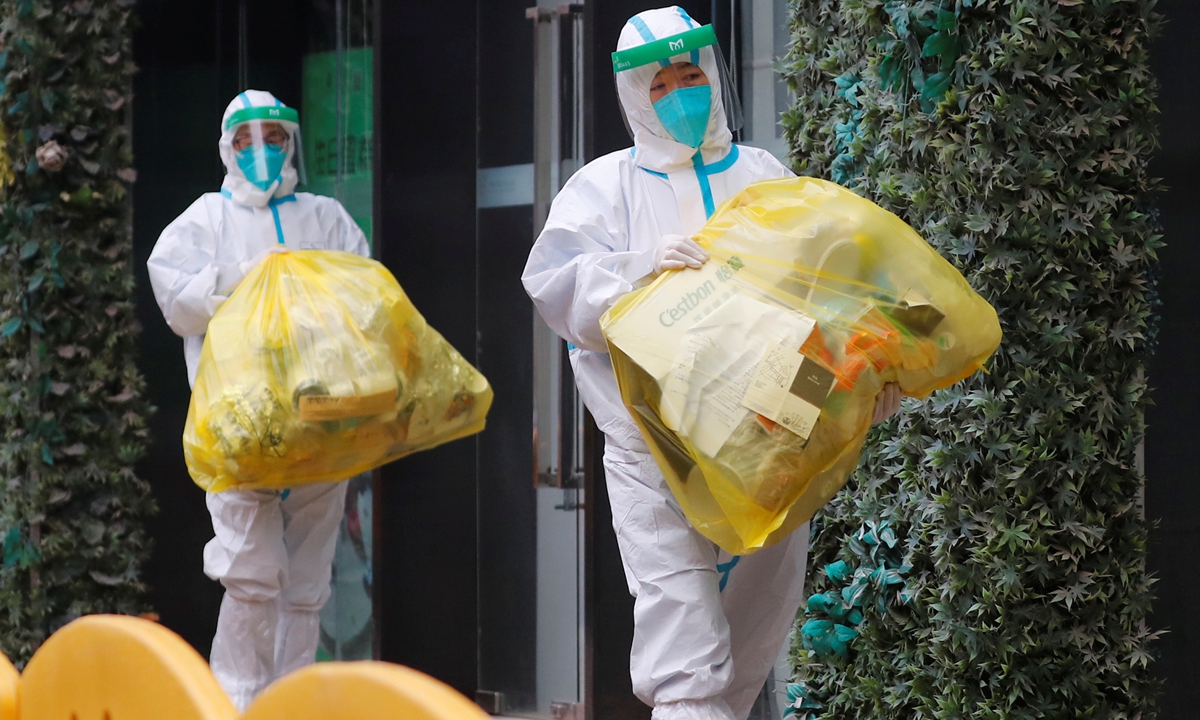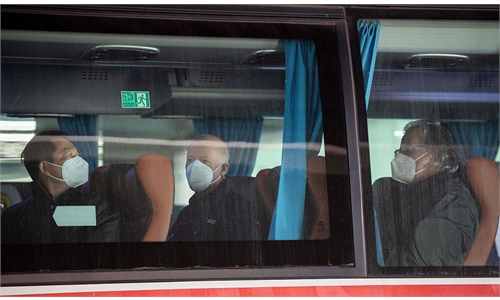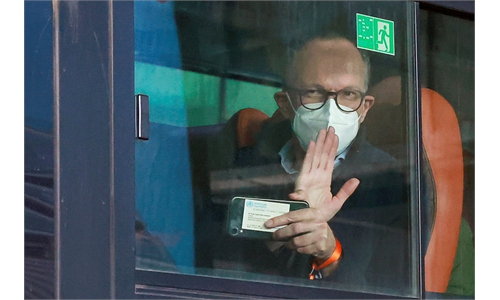Field visits in Wuhan ‘righteous and helpful’ for WHO experts' better understanding of COVID-19
Scientists deny restrictions, limitations in investigation

Workers wearing protective suits dispose of garbage after cleaning the rooms of WHO experts following their quarantine in Wuhan. Photo: IC
The WHO experts are going to the right places for field studies on the origin of the COVID-19 in Wuhan, including the Huanan Seafood Market, hospitals where the early patients were treated and the Wuhan virology lab, which will be helpful for them to get a better understanding of the virus, Chinese experts said, as the team of 13 international scientists officially started their investigation work on Friday.
The WHO experts headed to the Hubei Provincial Hospital of Integrated Chinese and Western Medicine on Friday where Dr. Zhang Jixian first reported the cases of "what was then known as pneumonia of unknown origin" on December 27, 2019.
"We were at the hospital where the first patient was identified in the last week of December 2019. We also met with staff there, and with one of the earliest known patient," Peter Ben Embarek, who leads the WHO team, told the Global Times, calling the visit "very informative."
Visits will include the Wuhan Institute of Virology, Huanan market and the Wuhan CDC laboratory, the WHO said on Thursday, and the experts will also speak to early responders and some of the first COVID-19 patients.
However, some Western media outlets such as the New York Times and the AFP have been hyping the hypothesis that China has been taking charge of this investigation, which may prevent the foreign experts from finding the origin of the virus. An AFP reporter even asked the question that has been repeated for months to the Chinese Foreign Ministry on Friday: "Will China make sure that these experts could access full relevant data?"
"My understanding is that there will be no restrictions or limitations in working with our Chinese colleagues or in visiting places the joint team deems of interest," Embarek told the Global Times.
Letting those experts to three places - Huanan market, Wuhan virology lab and local CDC - represents China's open and transparent attitude on this matter, as the Huanan market was the place where the earliest case was found, whether we could find more information about earlier cases from there is very important, Wang Guangfa, a respiratory expert at Peking University First Hospital, told the Global Times on Friday.
"Though China reported the earliest coronavirus case, we've seen earlier cases emerge outside China, and maybe some other countries took it as a flu," said Wang, who was also among experts of the National Health Commission who had visited Wuhan in early January 2020.
What we have done well was reporting these earlier cases and conducting further pathogenic testing, Wang stressed, adding that it would also be a question for the WHO experts to find out if much earlier cases existed and whether they were truly domestically transmitted.
Although the Huanan seafood market has been sealed off, the experts believe that there is still plenty to see and experience there. "[We hope to] understand the setting, see the places where cases were linked, reconstruct the initial event there, search for records of animals, products traded there. And possibly talk to some of the merchants who were there at that time," Embarek said.
Peter Daszak, a member of the team who is also from the US group EcoHealth Alliance, tweeted on Friday afternoon that "Extremely important 1st site visit. We are in the hospital that treated some of the first known cases of COVID-19, meeting with the actual clinicians and staff who did this work, having open discussions about the details of their work."
Going to the hospitals that treated earlier patients would help experts get to know more patient information, which will also be helpful for the investigation work, Wang said.
Visiting the Wuhan virology lab would also be helpful, though some former US officials like former US Secretary of State Mike Pompeo used the place as one argument in his anti-China agenda while politicizing the COVID-19 outbreak as well as the scientists' work on the question of the origin.
Yang Zhanqiu, a deputy director of the pathogen biology department at Wuhan University, told the Global Times that the Wuhan Institute of Virology has done many studies on seeking a virus on animals. For example, virologist Shi Zhengli from the institute has studied bats, a virus reservoir, for many years. Discussions between Chinese scientists and WHO experts could offer more clues on the origin.
Yang said that seeking the origin of the virus is very serious scientific work which should be conducted in different areas where the virus is spreading, including Europe and the US, at the same time. And an international platform should also be built for global scientists to share their new findings without any political interference.
Yang said that Chinese experts could also share China's experience in preventing the virus which would benefit the current global anti-virus fight.
Chinese Foreign Ministry spokesperson Zhao Lijian reiterated on Friday that this is an exchange of cooperation on the origin of the coronavirus, which is also part of global research. "This is not a probe," Zhao said.
With regard to their next step, for example, where to visit and with who to communicate, Chinese experts and WHO experts will make arrangements on the characteristics of the virus, the epidemic situation and previous consensus to make scientific and professional arrangements, Zhao said.
"We are not scientists or professionals. We should leave this highly professional work of tracing the origin to the experts and give them sufficient time and room with full support and confidence by reducing unnecessary interference and attention," he said.





